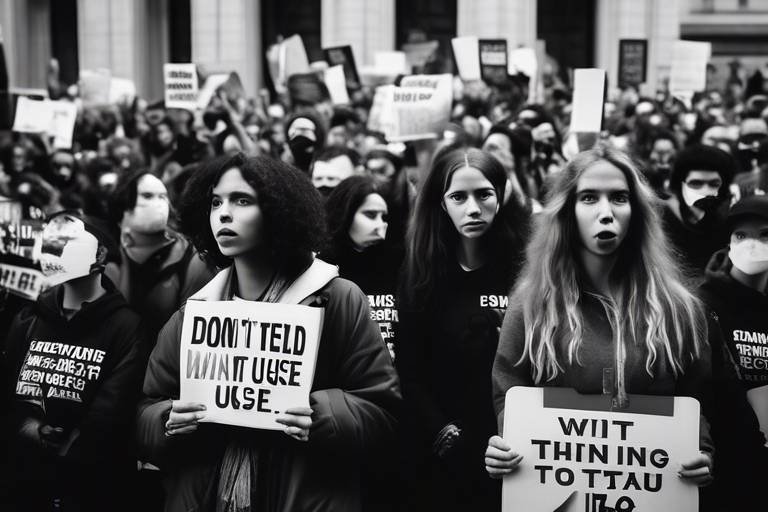The Effects of Online Activism on Political Change
In today's digital age, the landscape of activism has transformed dramatically, thanks to the rise of online platforms. Online activism has emerged as a powerful force that not only influences political movements but also mobilizes communities and shapes public opinion. This article delves into how digital activism has become a catalyst for significant political changes and reforms across various societies.
Over the past decade, digital activism has gained unprecedented momentum. With the proliferation of social media platforms, activists can now reach a global audience with just a few clicks. This shift has revolutionized the way people engage with political issues, transforming passive observers into active participants. No longer are people confined to traditional methods of activism, such as protests and rallies. Instead, they can leverage the power of the internet to amplify their voices and mobilize support for causes they believe in. The ability to organize online has led to a more engaged and aware populace, igniting a passion for political change that resonates across borders.
Social media platforms like Twitter, Facebook, and Instagram have become essential tools for organizing protests, sharing information, and connecting like-minded individuals. They foster a sense of community and urgency around political issues, making it easier for people to rally together for a common cause. For instance, during the Arab Spring, social media was instrumental in coordinating protests and disseminating information, showcasing its potential to drive political change.
One of the most significant innovations in digital activism is the use of hashtags. These simple yet powerful symbols have become synonymous with social movements, enabling users to rally support, raise awareness, and create a sense of solidarity among participants. Hashtags like #BlackLivesMatter and #MeToo have not only sparked conversations but have also significantly impacted public discourse and policy discussions.
Examining successful hashtags reveals their effectiveness in driving conversations and prompting legislative changes. For example, the #BlackLivesMatter movement has brought issues of racial inequality and police brutality to the forefront of national discussions, leading to policy reforms in various cities. Similarly, #MeToo has empowered countless individuals to share their experiences of sexual harassment, resulting in widespread changes in workplace policies and cultural attitudes toward consent.
However, the phenomenon of hashtag activism is not without its challenges. While hashtags can mobilize support, they may also lead to superficial engagement. Many users participate in trending conversations without a deeper understanding or commitment to the cause. This phenomenon raises the question: are we witnessing genuine activism, or merely a trend that fades as quickly as it arises?
Online activism plays a crucial role in shaping public opinion. Viral campaigns can bring attention to overlooked issues and challenge traditional narratives, ultimately swaying political discourse. For instance, the widespread sharing of information about climate change through social media has led to increased public awareness and pressure on lawmakers to take action. The digital realm has become a battleground for ideas, where the loudest voices can significantly influence the direction of public sentiment.
The intersection of online activism and policy change demonstrates how grassroots movements can influence lawmakers. Activists have the power to mobilize their communities and push for tangible changes in legislation and governance. This newfound influence has reshaped the relationship between the public and political leaders, making it increasingly difficult for lawmakers to ignore the voices of their constituents.
Digital platforms facilitate direct communication between activists and policymakers. This accessibility allows activists to advocate for their causes and exert pressure on political leaders to address pressing social issues. For example, campaigns that have gone viral often result in petitions that garner thousands of signatures, compelling lawmakers to take notice and act.
Evaluating the success of online activism involves analyzing both quantitative metrics, like engagement rates, and qualitative outcomes, such as changes in public policy or societal attitudes. Activists must not only track the number of shares and likes but also assess whether their efforts translate into real-world change. This dual approach ensures that activism remains impactful and relevant in an ever-evolving digital landscape.
- What is online activism? Online activism refers to efforts to promote social or political change through digital platforms, including social media, blogs, and websites.
- How has social media changed activism? Social media has made it easier for individuals to connect, organize, and mobilize support for causes, amplifying their voices on a global scale.
- What are some examples of successful online movements? Notable examples include #BlackLivesMatter and #MeToo, which have significantly influenced public discourse and policy changes.
- What challenges does online activism face? Challenges include superficial engagement, the potential for misinformation, and the difficulty of sustaining momentum beyond viral moments.

The Rise of Digital Activism
This article explores how online activism influences political movements, mobilizes communities, and shapes public opinion, ultimately leading to significant political changes and reforms in various societies.
In today's fast-paced world, the rise of digital activism has transformed the way we engage with political issues. Gone are the days when activism was confined to physical rallies and printed pamphlets. Now, with just a few clicks, individuals can amplify their voices and rally support for causes that matter to them. This shift has been largely fueled by the proliferation of social media platforms, which act as modern-day town squares where ideas can be exchanged, debated, and mobilized at lightning speed.
Digital activism is not just a trend; it’s a powerful movement that has changed the landscape of political engagement forever. With platforms like Twitter, Facebook, and Instagram, activists can reach a global audience, breaking geographical barriers and uniting people from diverse backgrounds. This connectivity fosters a sense of community and urgency, allowing individuals to come together around shared values and goals. It’s like having a megaphone that amplifies your message, making it impossible for policymakers to ignore.
Moreover, the accessibility of digital tools means that anyone with an internet connection can become an activist. Whether it's a young student sharing a post about climate change or a seasoned organizer launching a campaign, the barriers to entry have significantly lowered. This democratization of activism means that more voices are being heard, and as a result, a wider array of issues are being brought to the forefront of public discourse.
However, this rapid rise of digital activism is not without its challenges. While the internet can serve as a platform for genuine engagement, it can also lead to superficial interactions. Many individuals may share a post or use a hashtag without fully understanding the issues at hand or committing to the cause. This phenomenon, often referred to as "slacktivism," raises important questions about the effectiveness of online activism. Are we truly making a difference, or are we simply clicking our way through social justice?
Despite these challenges, the impact of digital activism is undeniable. It has sparked movements that have led to real political change, proving that when people unite online, they can create a force powerful enough to challenge the status quo. From the Arab Spring to the Women's March, the evidence is clear: digital activism is here to stay, and its influence on political change will only continue to grow.
- What is digital activism?
Digital activism refers to the use of digital tools and platforms, particularly social media, to promote social or political causes and mobilize support. - How has social media changed activism?
Social media has made activism more accessible, allowing individuals to connect, organize, and spread awareness quickly and efficiently. - What are some examples of successful digital activism?
Movements like #BlackLivesMatter and #MeToo have gained global traction through digital platforms, leading to significant discussions and policy changes. - What are the downsides of digital activism?
Challenges include superficial engagement, where individuals participate without a deep understanding of the issues, often referred to as "slacktivism."

Social Media's Role in Mobilization
In today's fast-paced digital age, social media has emerged as a game changer in the realm of political activism. Gone are the days when organizing a protest required extensive planning and resources; now, a simple tweet or Facebook post can galvanize thousands within hours. The power of social media lies in its ability to connect individuals from diverse backgrounds, creating a unified front for various causes. This connectivity fosters a sense of community and urgency, making it easier for activists to rally support and spread their messages far and wide.
One of the most compelling aspects of social media is its real-time communication capabilities. Activists can share updates, mobilize supporters, and disseminate crucial information about events as they unfold. This immediacy not only keeps followers engaged but also encourages them to take action. For instance, during the Arab Spring, social media platforms played a pivotal role in organizing protests and sharing live updates, demonstrating how digital tools can empower grassroots movements.
Moreover, social media allows for the creation of viral campaigns that can capture the public's imagination. A single post can ignite a movement, as seen with hashtags like #BlackLivesMatter and #MeToo, which have transcended their digital origins to become powerful symbols of social change. These hashtags serve as rallying cries, enabling users to join a broader conversation and amplify their voices. The emotional resonance of these movements often translates into tangible action, as people feel compelled to participate in protests, sign petitions, or support related initiatives.
However, the role of social media in mobilization isn't without its challenges. While it can inspire action, there is a risk of superficial engagement. Many users may share a post or use a hashtag without fully grasping the underlying issues or committing to the cause. This phenomenon, often referred to as "slacktivism," raises questions about the depth of engagement and the effectiveness of online activism. To combat this, activists must strive to educate their audiences, encouraging them to move beyond mere clicks and towards meaningful participation.
Additionally, social media can sometimes create echo chambers, where individuals only interact with like-minded people, reinforcing their beliefs without exposure to differing perspectives. This can hinder constructive dialogue and limit the potential for broader societal change. To address these challenges, activists should aim to foster inclusive discussions that welcome diverse viewpoints, ultimately enriching the movement and broadening its impact.
In conclusion, social media is a double-edged sword in the context of political mobilization. While it offers unprecedented opportunities for connection and action, it also presents challenges that must be navigated carefully. As we continue to witness the evolution of digital activism, it is essential for activists to leverage the strengths of social media while remaining vigilant about its pitfalls. By doing so, they can harness its full potential to drive meaningful change in society.

Hashtags and Movements
In the age of digital communication, hashtags have emerged as powerful symbols of social movements, acting as rallying points for individuals seeking to bring about change. They are more than just a collection of characters prefixed by the '#' symbol; they encapsulate the essence of a cause, making it easily identifiable and searchable across social media platforms. When you think of movements like #BlackLivesMatter or #MeToo, what comes to mind? These hashtags have transcended their digital origins, becoming cultural phenomena that have sparked conversations and inspired action on a global scale.
Hashtags serve multiple purposes in the realm of activism. They help to:
- Rally Support: By using a common hashtag, individuals can instantly identify themselves as part of a larger movement, fostering a sense of belonging and community.
- Raise Awareness: Hashtags can quickly disseminate information about issues that may have been overlooked, shining a light on injustices and prompting discussions that might not have occurred otherwise.
- Create Solidarity: When individuals post under a shared hashtag, it creates a visual representation of collective action, making it clear that many voices are united in their demands for change.
Moreover, hashtags can significantly impact public discourse. They enable users to engage in conversations that challenge traditional narratives, pushing marginalized voices to the forefront. This democratization of information is crucial, as it allows for a multitude of perspectives to be heard, often leading to a more informed public. For instance, during the height of the #MeToo movement, countless individuals shared their stories of harassment and abuse, creating a wave of awareness that forced institutions to confront uncomfortable truths.
However, it's essential to acknowledge the challenges associated with hashtag activism. While they can mobilize support, there is a risk of superficial engagement. Many users may participate in trending conversations without fully grasping the deeper issues at play. This phenomenon, often referred to as "slacktivism," raises questions about the effectiveness of online activism. Are we genuinely committed to the causes we support, or are we merely participating for social currency?
In conclusion, hashtags are more than just digital tools; they are powerful agents of change. They have the potential to mobilize communities, influence public opinion, and even drive legislative reforms. As we continue to navigate the complexities of digital activism, it’s crucial to remember the responsibility that comes with using these tools. Let’s strive for a deeper understanding of the movements we support and ensure our online engagement translates into real-world impact.
- What is the purpose of hashtags in activism? Hashtags help to organize and mobilize support for social movements, raise awareness, and create a sense of community among participants.
- Can hashtags lead to real change? Yes, hashtags can influence public opinion and drive legislative changes by bringing attention to important issues.
- What are the downsides of hashtag activism? One major downside is the potential for superficial engagement, where individuals participate without a deeper understanding or commitment to the cause.

Case Studies of Successful Hashtags
When we think about the power of online activism, certain hashtags stand out as beacons of change, igniting conversations and mobilizing communities around critical social issues. One of the most impactful examples is #BlackLivesMatter, which emerged in response to the tragic deaths of African Americans at the hands of police. This hashtag not only sparked a global movement advocating for racial justice but also influenced public discourse and policy reforms. It became a rallying cry for protests, social media discussions, and even legislative changes aimed at addressing systemic racism.
Another compelling case is the #MeToo movement, which gained traction when survivors of sexual harassment and assault began sharing their stories online. This hashtag transcended borders and industries, creating a powerful sense of solidarity among individuals who had faced similar experiences. The viral nature of the campaign led to significant conversations about consent, workplace culture, and accountability, ultimately prompting organizations and governments to reevaluate their policies regarding sexual misconduct.
To illustrate the effectiveness of these hashtags, let's take a closer look at their impact:
| Hashtag | Year Launched | Key Impact |
|---|---|---|
| #BlackLivesMatter | 2013 | Increased awareness of racial injustice; influenced police reform legislation. |
| #MeToo | 2006 (gained prominence in 2017) | Highlighted sexual harassment; led to changes in workplace policies and accountability measures. |
These hashtags serve as powerful reminders of how digital activism can amplify voices and foster a collective consciousness around pressing issues. However, it's essential to recognize that the success of these movements is not merely a result of their catchy phrases. It involves a complex interplay of grassroots organizing, media coverage, and the willingness of individuals to engage in meaningful dialogue. While hashtags can initiate conversations, the real work lies in sustaining momentum and ensuring that the issues remain at the forefront of public attention.
Moreover, the influence of these hashtags extends beyond social media platforms. They have been instrumental in shaping news narratives, influencing public opinion, and even impacting electoral outcomes. As we continue to navigate the digital landscape, it becomes increasingly clear that hashtags are not just symbols; they are catalysts for change, embodying the hopes and demands of communities seeking justice and reform.
- What is the significance of hashtags in online activism? Hashtags serve as a unifying tool that allows individuals to connect over shared causes, amplifying messages and mobilizing support.
- Can hashtag activism lead to real change? Yes, many successful movements, like #BlackLivesMatter and #MeToo, have demonstrated that online activism can influence public opinion and lead to tangible policy changes.
- How can I get involved in online activism? You can start by following relevant hashtags, sharing information, and participating in discussions to raise awareness about the causes you care about.

Challenges of Hashtag Activism
While hashtags have become a powerful tool for mobilizing support and raising awareness, they are not without their challenges. One of the primary issues is the phenomenon known as slacktivism, where individuals engage in minimal effort actions, such as sharing a hashtag, without taking further steps to support the cause. This can create a false sense of accomplishment, leading people to believe they have contributed meaningfully when, in reality, their involvement is superficial.
Moreover, the rapid spread of information on social media can lead to misinformation and polarization. Hashtags can sometimes amplify misleading narratives or oversimplify complex issues, causing confusion rather than fostering informed discussions. For instance, a trending hashtag might highlight a specific incident, but fail to capture the broader context, leading to a skewed understanding of the issue at hand.
Another significant challenge is the short attention span of social media users. In an era where new trends emerge at lightning speed, hashtags can quickly lose relevance. This fleeting nature of online engagement often means that critical issues may be forgotten just as quickly as they gained attention. Consequently, movements may struggle to maintain momentum over time, making it difficult to achieve long-term goals.
Additionally, there is the risk of co-optation by individuals or organizations that may not genuinely support the cause. This can dilute the original message and lead to a situation where the hashtag becomes a marketing tool rather than a rallying cry for change. It’s essential for activists to remain vigilant and ensure that their movements stay true to their core values, even as they navigate the complex landscape of digital activism.
Finally, the emotional toll on activists cannot be overlooked. Engaging in online activism can expose individuals to backlash, harassment, and trolling, which can be disheartening and detrimental to mental health. This aspect is often underreported but is crucial for understanding the full scope of challenges faced by those who choose to advocate for change through hashtags.
In summary, while hashtags are invaluable in the realm of online activism, they come with their own set of challenges that can hinder genuine engagement and progress. Activists must be aware of these pitfalls and strive to foster deeper connections and understanding within their communities to ensure that their efforts lead to meaningful change.
- What is slacktivism? Slacktivism refers to minimal effort actions taken by individuals to support a cause, often through social media, without engaging in more substantial efforts.
- How can misinformation affect hashtag activism? Misinformation can spread rapidly through hashtags, leading to misunderstandings and a lack of informed discussion on complex issues.
- Why do hashtags lose relevance quickly? The fast-paced nature of social media means that new trends emerge constantly, causing previous hashtags to fade from public attention.
- What is co-optation in activism? Co-optation occurs when individuals or organizations adopt a movement's message for their own purposes, often diluting the original intent of the activism.
- How can online activism affect mental health? Engaging in online activism can lead to exposure to negativity, harassment, and trolling, which can take a toll on activists' mental well-being.

Influencing Public Opinion
In today’s fast-paced digital world, online activism is not just a buzzword; it’s a powerful catalyst for change that shapes public opinion in profound ways. Think about it: a single tweet or a viral video can ignite a movement, drawing attention to issues that might otherwise fly under the radar. This phenomenon has turned everyday citizens into influencers, giving them the ability to challenge the status quo and reshape narratives. The impact of online activism is especially evident when we consider how quickly information spreads across social media platforms, allowing for the rapid dissemination of ideas and stories that resonate with the masses.
Social media platforms like Twitter, Facebook, and Instagram serve as modern-day town squares, where individuals can voice their concerns, share personal experiences, and rally support for various causes. These platforms create a sense of urgency and community, encouraging users to engage with issues they may not have previously considered. For example, during the COVID-19 pandemic, social media became a hub for sharing information about health guidelines, vaccine availability, and personal stories of struggle and resilience. This collective sharing not only informed the public but also fostered a sense of solidarity among individuals facing similar challenges.
Moreover, viral campaigns can bring attention to overlooked issues, effectively challenging traditional narratives. Consider how the #BlackLivesMatter movement raised awareness about systemic racism and police brutality, transforming what was once a niche concern into a global conversation. This shift in public discourse is critical because it pressures policymakers to respond to the demands of the people. When a significant portion of the population is vocal about an issue, it becomes increasingly difficult for political leaders to ignore it. In this way, online activism doesn't merely influence public opinion; it actively reshapes the political landscape.
However, it’s essential to recognize that the effects of online activism on public opinion are not always straightforward. While many campaigns succeed in raising awareness and prompting discussions, others may lead to misinformation or superficial engagement. For instance, the phenomenon of “slacktivism” describes situations where individuals feel they have contributed to a cause simply by liking or sharing a post, without taking any further action. This can create an illusion of progress while failing to address the underlying issues. It’s a double-edged sword: while online activism can mobilize support and foster awareness, it can also dilute the seriousness of a movement if participants don’t engage meaningfully.
To navigate this landscape, activists and organizations must strive for deeper engagement. This means encouraging followers to not only share content but also participate in discussions, attend events, or contact their representatives. By transforming passive engagement into active participation, online activism can more effectively influence public opinion and drive real change. As we move forward, the challenge lies in harnessing the power of digital platforms while ensuring that the engagement is both genuine and impactful.
- What is online activism? Online activism refers to the use of digital platforms and social media to promote social or political causes and mobilize support.
- How does social media influence public opinion? Social media amplifies voices, spreads information quickly, and fosters community engagement, all of which can significantly shape public perceptions and attitudes.
- What are some examples of successful online activism? Movements like #BlackLivesMatter and #MeToo have successfully raised awareness and prompted discussions on issues like racial injustice and sexual harassment.
- What is slacktivism? Slacktivism describes a form of activism that involves minimal effort, such as liking or sharing a post, without deeper engagement or action.
- How can online activism lead to real-world change? By mobilizing communities, influencing public opinion, and pressuring policymakers, online activism can result in tangible changes in legislation and social attitudes.

The Impact on Policy Change
In today's fast-paced digital world, the intersection of online activism and policy change is more significant than ever. Grassroots movements, often spearheaded by passionate individuals on social media, have the power to influence lawmakers and drive substantial changes in legislation. But how does this actually happen? It starts with the collective voice of the people, amplified through the digital landscape, creating a ripple effect that reaches decision-makers.
One of the most compelling aspects of online activism is its ability to mobilize individuals around a common cause. When a particular issue gains traction online, it can quickly become a focal point for public discourse. This widespread attention often pressures politicians to respond, as they recognize that ignoring these issues could have electoral consequences. For instance, the #MeToo movement not only raised awareness about sexual harassment but also led to significant legislative changes aimed at protecting victims and holding perpetrators accountable. It’s a prime example of how a digital conversation can translate into real-world action.
Moreover, digital platforms facilitate direct communication between activists and policymakers, creating a channel for advocacy that was not as accessible in the past. Activists can tag lawmakers in posts, share petitions, and even organize campaigns that call for specific policy changes. This direct engagement is crucial; it allows citizens to hold their representatives accountable and demand action on pressing social issues. For example, during the climate change protests, many young activists utilized platforms like Instagram and Twitter to engage with politicians, urging them to prioritize environmental policies. The result? Increased visibility of climate issues in legislative agendas.
However, measuring the success of these online movements can be complex. It involves analyzing both quantitative metrics, such as the number of shares, likes, and comments, as well as qualitative outcomes, like shifts in public policy or changes in societal attitudes. A table summarizing some key metrics could help illustrate this point:
| Campaign/Movement | Engagement Metrics | Policy Outcomes |
|---|---|---|
| #BlackLivesMatter | Millions of tweets, global protests | Changes in police reform legislation in multiple states |
| #MeToo | Over 19 million tweets | New laws against workplace harassment |
| #ClimateStrike | Global participation of millions | Increased governmental focus on climate policies |
Despite these successes, it’s important to recognize that online activism is not without its challenges. The rapid pace of social media can sometimes lead to what is known as "slacktivism," where individuals feel they have contributed simply by liking or sharing a post without taking further action. This superficial engagement can dilute the impact of movements, making it essential for activists to encourage deeper involvement from their supporters. Ultimately, the effectiveness of online activism in driving policy change hinges on transforming digital passion into tangible action.
- What is online activism? Online activism refers to the use of digital platforms to promote social causes, organize movements, and influence policy changes.
- How can I get involved in online activism? You can participate by following movements on social media, sharing information, signing petitions, and contacting your local representatives.
- Are hashtags effective in driving change? Yes, hashtags can unite supporters, raise awareness, and create a sense of community, significantly impacting public discourse.
- What are some examples of successful online activism? Movements like #BlackLivesMatter and #MeToo have successfully influenced legislation and public opinion on critical social issues.

Engagement with Policymakers
In today's digital age, the connection between grassroots activism and policymakers has never been more pronounced. Social media platforms like Twitter, Facebook, and Instagram have become the virtual town halls where activists can voice their concerns directly to those in power. This engagement is not just about shouting into the void; it’s about creating a dialogue that holds leaders accountable. Imagine a world where a single tweet can prompt a senator to reconsider a controversial bill or where a viral video can shine a spotlight on an overlooked issue. This is the power of online activism!
One of the most effective strategies for engaging with policymakers is through targeted campaigns that leverage social media. Activists can organize letter-writing campaigns, petitions, or even social media blitzes that tag elected officials, urging them to take action. For instance, when a significant number of constituents tweet at their representatives using specific hashtags, it creates a sense of urgency that cannot be ignored. It’s like a digital wave crashing against the walls of bureaucracy, demanding attention and action.
Furthermore, the accessibility of digital platforms allows for a more inclusive approach to activism. Individuals from diverse backgrounds can share their stories and experiences, making issues more relatable and urgent. This collective storytelling not only humanizes the issues at stake but also pressures policymakers to listen and respond. After all, when they see real people affected by their decisions, it’s harder to dismiss the cause. Consider campaigns like #ClimateStrike or #GunControlNow; these movements have successfully mobilized thousands to demand action from their leaders.
However, while the engagement with policymakers through online activism is powerful, it does come with its challenges. The sheer volume of messages that elected officials receive can dilute the impact of individual voices. Therefore, it’s crucial for activists to craft compelling, concise messages that clearly articulate their demands. Moreover, maintaining a consistent presence and follow-up can enhance the effectiveness of these engagements.
In summary, the relationship between online activism and policymakers is a dynamic one, filled with potential and pitfalls. As activists continue to harness the power of digital platforms, they not only amplify their voices but also create pathways for meaningful dialogue and change. The challenge lies in ensuring that these engagements translate into real-world action and policy reform. As we look to the future, it’s essential for activists to remain vigilant, strategic, and united in their efforts to engage with those who hold the keys to change.
- How can I effectively engage with my local policymakers?
Start by following them on social media, attending town hall meetings, and sending well-crafted emails or letters outlining your concerns and suggestions. - What role do hashtags play in online activism?
Hashtags help to categorize and amplify messages, making it easier for people to find and join conversations about specific issues. - Can online activism lead to real policy changes?
Yes! Many successful movements have resulted in tangible policy changes, as they mobilize public opinion and pressure lawmakers to act.

Measuring Success in Activism
When it comes to , the task can feel as daunting as trying to catch smoke with your bare hands. Activism is not just about the noise; it’s about the impact, and understanding that impact requires a multifaceted approach. One of the primary ways to gauge success is by examining both quantitative metrics and qualitative outcomes. But what does that really mean?
Quantitative metrics often include engagement rates, such as likes, shares, and comments on social media platforms. These numbers can provide a snapshot of how many people are interacting with a cause. For instance, a campaign that garners thousands of retweets might seem successful at first glance. However, it’s essential to dig deeper. Are these interactions translating into real-world actions like attending protests, signing petitions, or engaging with policymakers?
On the other hand, qualitative outcomes focus on the long-term effects of activism. This might involve assessing changes in public policy, shifts in societal attitudes, or even alterations in the way media covers specific issues. For example, if a hashtag trend leads to a legislative hearing or a new law being passed, that’s a tangible success that goes beyond mere digital engagement.
To give you a clearer picture, let's take a look at a table that illustrates some common metrics used to measure success in activism:
| Metric Type | Description | Example |
|---|---|---|
| Engagement Rate | Measures interaction levels on social media | Likes, shares, comments |
| Media Coverage | Tracks how often an issue is covered in news outlets | Articles, interviews, segments |
| Policy Changes | Looks at new laws or amendments resulting from activism | New legislation passed |
| Public Sentiment | Measures shifts in public opinion on key issues | Surveys, polls |
Ultimately, measuring success in activism is not a one-size-fits-all approach. Each movement has its unique goals and challenges. It's crucial to remember that even if a campaign doesn't result in immediate legislative changes, it might still shift public discourse or raise awareness about an important issue. This, in itself, can be a significant victory.
Moreover, the landscape of activism is ever-evolving, especially in the digital age. With the rise of new platforms and technologies, activists must adapt their strategies continually. This adaptability can also serve as a metric of success, as movements that evolve with their audiences are often more effective in achieving their goals.
- How can I get involved in online activism? You can start by following social media pages dedicated to causes you care about, sharing information, and participating in online campaigns.
- What are some effective ways to measure the impact of my activism? Track engagement metrics on social media, monitor media coverage, and look for changes in public policy related to your cause.
- Can online activism really lead to real-world change? Absolutely! Many movements have successfully transitioned from online campaigns to significant real-world impact, influencing legislation and public opinion.
Frequently Asked Questions
- What is online activism?
Online activism refers to the use of digital platforms, especially social media, to promote social or political causes. It allows individuals and groups to mobilize support, raise awareness, and engage in discussions about various issues. Think of it as a virtual megaphone that amplifies voices and connects people across the globe.
- How does social media influence political change?
Social media acts as a catalyst for political change by providing a space for organizing protests, sharing critical information, and fostering community among activists. It allows for rapid dissemination of messages, making it easier for movements to gain traction and influence public opinion. It's like a digital town square where ideas can spark action.
- What role do hashtags play in activism?
Hashtags are powerful tools in online activism, serving as rallying points for movements. They help to categorize content, making it easier for supporters to find and engage with related posts. Hashtags like #BlackLivesMatter and #MeToo have become symbols of larger social movements, creating a sense of unity and urgency among participants.
- Can online activism lead to real-world change?
Absolutely! While online activism may start in the digital realm, it can lead to significant real-world changes. Grassroots movements often leverage online platforms to pressure lawmakers and influence policy decisions. This connection between online efforts and tangible outcomes is what makes digital activism so impactful.
- What are some challenges of online activism?
One of the main challenges is the potential for superficial engagement. Many people may participate in campaigns online without a deep understanding of the issues or a commitment to the cause. This can dilute the effectiveness of movements and lead to "slacktivism," where individuals feel good about their participation without taking further action.
- How can success in online activism be measured?
Success can be evaluated through both quantitative and qualitative metrics. Quantitative measures might include engagement rates, shares, and likes, while qualitative outcomes focus on changes in public policy, societal attitudes, or increased awareness of specific issues. It's essential to look at both sides to get a complete picture of impact.
- What is the importance of engaging with policymakers?
Engaging with policymakers is crucial as it allows activists to directly advocate for change. Digital platforms facilitate this communication, enabling activists to voice their concerns and press for action on pressing social issues. It’s about making sure that those in power hear the demands of the people.



















